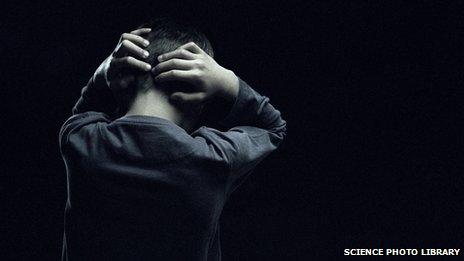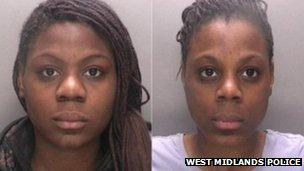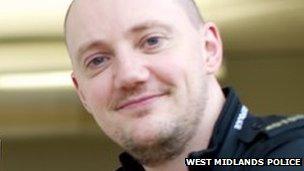Getting West Midlands victims to report 'mate crime'
- Published

Disability charity Mencap says as many as nine out of 10 people with a learning disability has been a victim of a hate crime
Lyndsey Rolston thought the group of children who lived near her West Midlands home were her friends.
But things changed.
The children, as young as four, started climbing up a tree near the Walsall home of Lyndsey, who has severe learning disabilities, shouting abuse at her and taking photos on mobile phones. They also smashed her collection of garden ornaments.
"I felt devastated," said 39-year-old Lyndsey's mother Patricia, who is also disabled.
"Lyndsey got so upset by it. She can't talk, and she would sit quietly on the sofa.
"It was just because she was different that they picked on her."
Across the West Midlands, there were 2,849 incidents catalogued as "hate crimes" in 2011-12.

Whitney and Yasmine Notice were jailed for abusing a man with learning disabilities
Out of those 2,531 were connected to race, 52 to religion, 46 to disability and 10 to transgender people.
Police here now unusually want to see some crime statistics rise - by encouraging more people, particularly those with disabilities, to report bullying and anti-social behaviour.
In November, two sisters from Birmingham were jailed after plying a 22-year-old man with learning disabilities with cider and threatening him with a fake gun before forcing him to strip and sexually abusing him.
Nineteen-year-old Yasmine Notice and her 20-year-old sister Whitney filmed the abuse, which happened in February 2012 at their Nechells flat, on a mobile phone.
The photos were passed around friends, which led to them being caught by the police.
Difficult to detect'
"The sad thing is that it takes horrendous cases to happen to change things," PC Gary Stack, West Midlands Police's dedicated hate crime officer.
"This was an example of 'mate crime' - when the vulnerable person puts their faith in someone who then goes on to abuse them, and it makes it very difficult to detect."'
Last month, a national review into police, probation and the Crown Prosecution Service in England and Wales found disability hate crime was often "overlooked" and "under-reported".
The report was prompted after Fiona Pilkington killed herself and her disabled daughter Francecca Hardwick in Leicestershire in 2007 after repeated complaints to police about harassment by youths.
Disability charity Mencap has estimated as many as nine out of 10 people with a learning disability has been a victim of a hate crime.
"The people we work with can often have suffered bullying for most of their lives," said Jonathan Kean, from Creative Support, an organisation which provides social care services for people with learning disabilities, mental health issues and other needs.
"That's what they've come to expect and they don't see people making their lives a misery as unusual.
"That's what's so tragic."
The Creative Support staff are some of the latest to be trained by PC Stack on how to report hate crime on behalf of those who do not want to themselves - or are unable to.
More than 20 "third-party reporting centres" are now either running - or planned - across Birmingham for communities targeted by abusers, including the Deaf Cultural Centre, Mencap, the Healthy Gay Life group, the Handsworth Sikh Community and the Birmingham Chinese Society.
The advisors are trained to look out for signs of abuse and tell police on behalf of the victims.
"A lot of people don't know they can report crimes anonymously," said PC Stack.
'Spitting on him'
"And in many cases the victims just don't want a lot of fuss.
"One man who was blind who went to the Action For Blind centre, and while there mentioned he'd had some problems with some kids pushing past him at a bus stop and spitting on him.
"He said he'd sorted the problem himself - by buying a raincoat.
"Someone at the centre told us and we put PCSOs on bus routes, and the local school put teachers at the bus stop in the evenings and the abuse stopped. Even now, he doesn't know the police got involved."

PC Gary Stack said crimes targeting disabled and transgender people were particularly under-reported
West Midlands Police's success in improving the reporting of hate crime is now being copied by other forces, including Sussex Police who are now setting up similar contact centres.
However, officers say there is still a lot of work to be done.
"Many crimes - particularly targeting disabled people and also transgender people - still are under-reported," said PC Stack.
"Some of that is through distrust of the police, the fact they might not even realise they're being abused or they don't think anything can be done.
"When you speak to a transgender person, they will tell you they can experience five or six incidents a day - they're unlikely to report each of those."
For Mrs Rolston, reporting what happened to her daughter was the best thing she could have done.
"Lyndsey was put on the 'vulnerable persons list', which meant if there were any problems again they'd treat it as an emergency," she said.
"The police told the council, which cut back the tree, and the kids' parents were talked to.
"It improved things so much for us - I hope everyone gets the same opportunities."
- Published21 March 2013
- Published10 September 2012
- Published23 February 2012
- Published9 March 2012